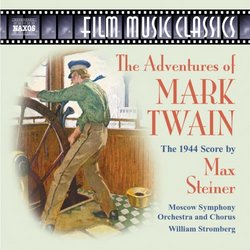Great Sounding Movie Music
J Scott Morrison | Middlebury VT, USA | 12/13/2004
(4 out of 5 stars)
"This is probably not 'great' music, but it certainly is great-sounding music. And it takes me back to my childhood in the 1940s when every Saturday afternoon found my brother and I and our friends in the local movie theater, watching whatever had just come to our little town. 'Mark Twain' was one of that seemingly endless supply of biopics that played fast and loose with the actual facts of their subjects' lives. And in this case there was also the interference of Twain's daughter, Clara Clemens Gabrilowitsch (wife of the pianist/conductor Ossip Gabrilowitsch), who was determined to protect her father's image. She was concerned that nothing be mentioned about her father's darker irreligious writings, even though he had been long dead and his reputation remained secure. Be that as it may, Frederic March, who had to learn how to brandish Twain's trademark cigar expertly, played him with panache.
For our purposes, none of this particularly matters. What does matter is that Max Steiner wrote a lush mittel-Europäisch score that nonetheless brims with American tunes from 'Dixie' to ''Swing Low, Sweet Chariot' to 'Aloha Oe.' It is more than a little ironic that Steiner used Wagnerian harmonic procedures to underscore a picture about the man who famously commented to the effect that Wagner's music isn't as bad as it sounds. We get 29 cues such as 'The River Pilot,' 'Frogs,' 'Gold Rush,' Mark Twain is Discovered,' 'Meeting General Grant,' 'World Tour Begins,' 'Comet's Return.' The latter, of course, is about the appearance of Halley's comet at Twain's death just as it had appeared 75 years earlier at his birth.
The score has the usual amount of mickeymousing--as in the 'Frogs' section which recreates the famous jumping frog of Calaveras County (with amusing contra-bassoon licks), or in 'Buggy Ride.' But it also has long-limbed and gorgeous melodies, even some proto-jazz rhythms along with what have become clichéd Westernisms--the clopping of horses' hooves and the like. Unlike some of his fellow central European emigré composers (like, say, Erich Wolfgang Korngold, Miklos Rosza and Franz Waxman), Steiner was able to master American melody and manner. This score can be enjoyed without any knowledge of the movie from which is comes at least partly because it is so evocative of such things.
The 100-minute score was arranged (and abridged somewhat) by John Morgan, who also contributes helpful notes about what he did. William Stromberg, who specializes in conducting movie scores (although he has also recorded non-cinematic music as well), does a bang-up job leading the excellent Moscow Symphony Orchestra. The recorded sound is all one could ask.
I thoroughly enjoyed this recording, not least because of its ability to take me back to those halcyon days of the wartime 1940s when a small boy could lose himself happily for several hours in a movie theater.
Scott Morrison"


 Track Listings (29) - Disc #1
Track Listings (29) - Disc #1